As pranksters prowl for marks on April Fools Day, they might want to know how their punchline will land.
According to data from 23andMe, genetics plays a role in a person’s sense of humor and ability to get a joke. (Although we love a good gene pun and wordplay — “Mom’s genes” anyone? — we’ll spare you any gene puns this time around.)
This is not a joke
Indeed, like most traits, our sense of humor is influenced by genetics and environmental factors like upbringing, culture, and social circle.
This is evident in 23andMe’s data, which shows regional and gender differences. For example, women rated themselves as having a lower sense of humor and ability to get jokes.
This could have less to do with men having a better sense of humor and more with how women self-assess their humor. It could also reflect cultural norms that have even penalized funny women in the workplace and perpetuated the “women aren’t funny” myth.
23andMe also found that jokes land a little better in Illinois, home of Chicago’s humor mill Second City, than in the barren plains of North Dakota. Another place where they love to laugh is Washington, D.C. No joke!
The Genetics of Humor
But there are also interesting genetic components to one’s sense of humor.
There may be evolutionary advantages to having a funny bone, and studies have looked at the genetics of the propensity to show positive emotional expressions like laughing and smiling, as well as the ability to get a joke and ‘mating success.’
For instance, humor helps establish social bonds. 23andMe researchers looking at data from customers who have consented to participate in research found interesting genetic associations with having a sense of humor that centers on brain development, cognitive function, and intelligence. One of the strongest associations we found for a person’s ability to get a joke was in a gene that is important for neurodevelopment and a significant player in autism.
Scientific Details
So how did we do this?
We asked just over one million 23andMe customers who consented to participate in research the following questions:
- On a scale of 1-5, how would you rate your sense of humor? Answers included 1 (Below Average), 2, 3 (Average), 4, 5 (Above Average)
- How easy is it for you to get jokes? Answers included Very Easy, Somewhat Easy, Somewhat Hard, and Very Hard.
Before we delve into genetics, let’s look at demographics where we saw the starkest differences: among the sexes. (As a side note, about 70 percent of people assess themselves as being above average in having a sense of humor, and only 5 percent say they are below average. This could be that people don’t think of population averages but instead are just indicating if they have a “good” or “bad” sense of humor.) OK, back to demographics. Women were about half as likely to report a sense of humor (Figure 1, p-value < 7.0e-05, OR=0.6) and about twice as likely to report difficulties getting a joke (Figure 2, p-value < 7.9e-09, OR=2.0).
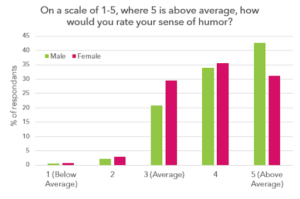
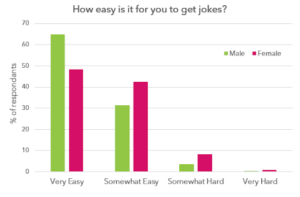
Regional Differences
We also found some tiny regional variations. People in the District of Columbia, New York, and California were the most likely to rate themselves as having a good sense of humor, while those in Puerto Rico, Mississippi, and North Dakota were the least likely (Figure 3).
The District of Columbia, Delaware, and Illinois participants were the most likely to “get a joke.” Puerto Rico, Alaska, and Maine participants were the least likely (Figure 4). While we did find that the differences between the highest-ranking and lowest-ranking states were statistically significant (sense of humor p-value = 2.215e-10; gets jokes p-value = 6.372e-12), the mean differences between states are not particularly large.
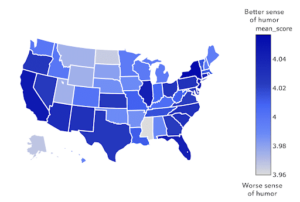
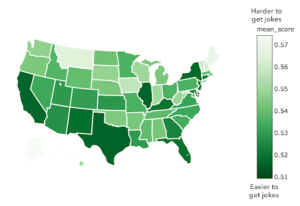
We ran two genome-wide association studies to investigate the underlying biology of having a sense of humor and getting jokes. The data was from unrelated people of European descent. We controlled for age, sex, genetic ancestry, and the version of the genotyping platform.
More than two dozen genetic variants reached genome-wide significance. Those are indicated in red in Figure 5 for a sense of humor. And in Figure 6 for getting jokes. Red dots show genetic variants that are “statistically significantly” associated with the trait being investigated. In this case, having a sense of humor and getting jokes. That means they’re more likely to be real associations (as opposed to random noise).
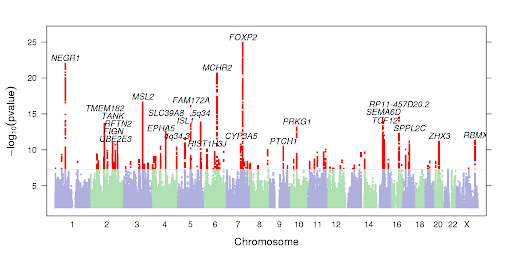
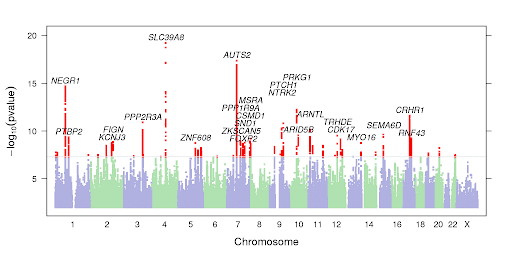
A Joke Gene?
This is where it gets interesting. We saw several significant genetic associations that overlapped between the self-rated sense of humor and the ability to get jokes.
The strongest association for the “sense of humor” trait was within FOXP2, a gene known to be incredibly important for the ability to use language. Several associations were with other genes somehow involved in brain function. Those include PTCH1, which is involved in brain development, and SEMA6, which is involved in neurodevelopment more generally. Finally, there was an association with NEGR1, which is implicated in both obesity and intelligence.
We also found associations in PRKG1. The PRKGI gene is involved in foraging and self-regulation. Foraging and self-regulation are related to goal-directed behavior, such as finding and gathering food. They require recall and pattern recognition. This comes in handy with sophisticated word constructs that make up humor. Another hit was found at SLC39A8. It’s involved in the uptake of manganese, an element in brain function.
So What?
As we said earlier, our researchers also found a strong association between one’s ability to “get jokes” and AUTS2. This gene is essential for neurodevelopment and a major player in autism.
Some studies have shown that individuals with Asperger’s Syndrome or those with high-functioning autism tend to have a different style of humor. Often, people with these conditions don’t laugh at what is commonly found as funny. However they laughing at scenarios some don’t believe to be humorous.
Humor is universal. It’s a way to bond with other people and connect. It’s part of what makes us human. Understanding why we are the way we are and how a trait like humor is associated with neurodevelopment adds to our understanding of what makes us. And like all complex behavioral traits, there isn’t a single gene for a well-developed funny bone. Instead, many genetic variants and environmental causes give us our sense of humor.
Maybe someday we’ll have data on the genetics of pulling a good prank. So this April 1st, don’t get caught with your genes down, and get ready to smile.
Find Out More
Explore what your DNA says about you and all you can learn using 23andMe.




